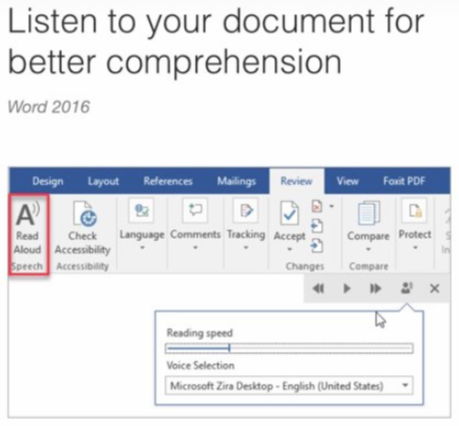The Harris County Law Library’s Legal Tech Institute is pleased to announce a special visitor, D. Casey Flaherty, a recognized leader in legal tech innovation and the creator of the Procertas legal tech audit. Please join us on Monday, August 19 and 11:00 am for a CLE presentation called Legal Tech is not optional. Mr. Flaherty will share his insights about using technology in the practice of law and will highlight how the Procertas Legal Tech Assessment, which is available to all for free at the Harris County Law Library, can help attorneys work toward legal tech competence. Texas attorneys will earn one hour of CLE credit and .5 hours of ethics credit for attending. Join us!
Text-to-Speech Options
In order to better serve our visually impaired patrons, we at the Harris County Law Library recently explored our options for providing text-to-speech services. We were happy to discover three free tools: Otter, TTS Reader, and Microsoft Word. Each is described below.
Otter: Otter is more than just a text-to-speech application. Also included are a dictation feature and automatic, real-time transcription. The app and the basic plan, which offers 600 minutes of dictation per month, are free.
TTS Reader: Text To Speech Reader converts any text to spoken language. TTS will read your text in a natural voice. Choices include UK and US English in a male or female voice, in a range of reading speeds from Very Slow to Too Fast. Drag and drop files or paste content into the provided text box. TTS Reader will read aloud for you in whichever voice you select and at whichever speech you prefer.
Microsoft Word: The newest versions of MS Office (2016, 2019, and Office 365) include a Read Aloud feature, allowing you to listen to your document for better comprehension. Words will be highlighted simultaneously as they are being read. To use this feature, simply open Word, click Review tab > Read Aloud, or press Alt+Ctrl+Space on your keyboard. Click Play/Pause to start and stop the narration. Select Settings to change the reading speed.
If you are using MS Office 2013, there is another option for accessing the text-to-speech conversion feature. Follow the steps outlined here (and see image below) to turn this feature on in Word 2013.
Open Word
Click the “Customize Quick Access Toolbar” button which is located at the very top of your window above the Tabs (File, Home, Insert, Design, Layout, etc.) Select “More Commands”
On the “Choose Commands From:” dropdown menu, select “Commands Not in the Ribbon”
Scroll down to the “Speak” option, then click Add. Click Add when you are finished.
Now, highlight the text to be read aloud. Click the Speak Button, which looks like a small speech bubble, on the Quick Access Toolbar. Word will read your text. It’s that easy!
Harris County Attorney Ryan unveils Digital Education Nook at Law Library
The Law Library was pleased to welcome Harris County Attorney Vince Ryan to unveil the latest addition to our digital outreach initiatives —the Digital Education Nook. We were also joined by Gabe Baker, Community Outreach Specialist for the Office of Lina Hidalgo, Harris County Judge, to introduce the Law Library’s latest effort to promote digital inclusion.
“The Digital Education Nook is a section in the Law Library where visitors can sit down and watch on-demand video content,” said County Attorney Ryan. “These videos cover a wide range of topics relevant to both the general public and to practicing attorneys.”
With content like a self-help collection, which is made available in collaboration with the Texas Office of Court Administration, self-represented litigants in Harris County can now have access to short tutorials on legal processes, such as “How to file a case?” and “How to appear in court?”, regardless of their ability to afford computer equipment or pay for home broadband or mobile data plans.
Attorneys can watch, learn, and earn Texas continuing legal education credit for free via videos of experts who visit to share their knowledge at live programs in the Harris County Attorney Conference Center. The programs are recorded and then made available for viewing through the Digital Education Nook.
“We’ve found that recent graduates still struggling with student loan debt and small firm attorneys without a big budget benefit tremendously from the free opportunities to stay up-to-date with the latest technology,” said Sears. “Since these are the folks who frequently serve individuals who might otherwise have to represent themselves, we try to focus on expanding training opportunities for small firm attorneys.”
See the Harris County Attorney’s Office press release to learn more and visit the Law Library’s webpage for details about the Digital Education Nook.
Google, Privacy, and You
The subject of a recent opinion piece in the New York Times discusses the “privacy paradox,” a sort of cognitive dissonance that compels us to share information about ourselves on every available platform while simultaneously cursing the technology that makes our compulsive sharing habits so addictive. That paradox can have wide-ranging implications for the legal community, which now has an ethical obligation to “remain competent in the practice of law, including the benefits and risks associated with relevant technology.” The ubiquity of Google makes it necessary for lawyers to understand the impact it can have on the clients being served. For example, when Google periodically pings your device to track your location even when your device-location feature is turned off , it might implicate jurisdictionally-specific privacy rights or contract law, as a recent investigation by the attorney general of Arizona suggests.
Mapping a device’s location is only one tracking method commonly employed by prominent tech companies. Google tracks you in all sorts of ways through apps, it’s Chrome browser, and more. The information is used to facilitate marketing efforts, including sales to third-party marketing firms, and to integrate your online experience. A recent New York Times op-ed by Google’s CEO provides the company’s view on protecting data privacy while using the data collected to create a more customized economy. At its annual developer conference just weeks ago, Google reinforced its commitment to privacy with the launch of two new efforts — better cookie controls and guards against fingerprinting. Additional trust-building measures are likely in the works (including security features in the redesign of Gmail), especially as increasing numbers of users defect from Google to alternative browsers like Brave and Vivaldi.
The takeaway for legal professionals: Follow news about Google and keep reminding clients who find themselves in a privacy paradox about how information is used in the information economy.
New On-Demand Video CLE: Practical Cybersecurity for Lawyers
The Legal Tech Institute at the Harris County Law Library has just released a new video CLE. Practical Cybersecurity for Lawyers is the latest addition to our Learning On-Demand CLE library, where you can earn CLE credit in Texas while staying up to date on legal tech. Visit the Law Library's Legal Tech Institute page for more on our legal tech learning opportunities.












